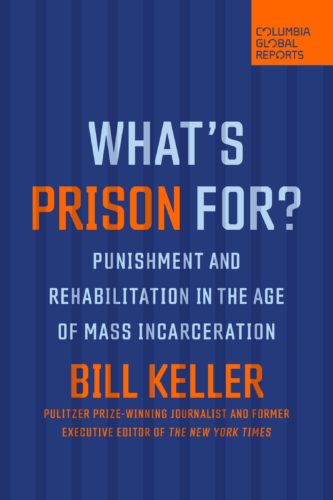Book Review: “What’s Prison For?” — A Case for Building Trust and Mutual Respect
By Bill Littlefield
In this valuable and necessary book, Bill Keller argues that American prisons need to accept that men and women don’t stop being human beings because they’re in the custody of the state.
What’s Prison For?: Punishment and Rehabilitation in the Age of Mass Incarceration by Bill Keller. Columbia Global Reports, New York, 159 pages, $16.
 One of Bill Keller’s informants characterizes what he terms “the cynical cycle of American justice” this way: “Sweep up young men, mostly from broken families in underprivileged neighborhoods, put them away for a while, send them back onto the streets with no skills, and repeat.”
One of Bill Keller’s informants characterizes what he terms “the cynical cycle of American justice” this way: “Sweep up young men, mostly from broken families in underprivileged neighborhoods, put them away for a while, send them back onto the streets with no skills, and repeat.”
The man who came up with that characterization, Patrick Nolan, was “an earnest law-and-order conservative” who was “indicted on charges of racketeering, conspiracy, extortion, and money laundering.” After his release from a federal prison camp, Nolan became active in prison reform.
Criticism of this country’s prison system also comes from the left, where some argue for the abolition of prisons. Keller doesn’t go that far. In What’s Prison For? he recounts what prison officials and correctional officers have learned by visiting prisons in countries that have approached incarceration with the assumption that men and women don’t stop being human beings because they’re in the custody of the state. In Norway, Germany, and various other countries that are much less given to mass incarceration than ours, education and rehabilitation are paramount. Residents grow their own vegetables, prepare and cook their own meals, and enjoy at least some degree of privacy. They have access to grounds similar to parks. The mindset of many US prison officers, writes Keller, is that “every tool is a potential weapon, private bathrooms are an invitation to rape or suicide, trees are escape ladders.”
It’s encouraging to hear that at least a few administrators and correctional officers are curious to learn about alternatives regarding how the prison system is run in this country. Also encouraging: various educational programs that Keller describes. Some of those programs involve anger management and technical training; others lead to advanced degrees. In the most exciting of those programs, incarcerated men and women and the correctional officers working in the institutions were invited to be students together. This opportunity to collaborate can’t help but encourage mutual understanding. Everyone in the room is a human being who needs what all human beings need — kindness, understanding, and respect, among other things. Building that kind of empathy may seem a modest goal, but it would be a great leap forward.

Bill Keller, executive editor of the New York Times from 2003 to 2011.
As others have done, Keller cites the depressing statistics about divorce, depression, post-traumatic stress disorder, and suicide among correctional officers. He is likewise concerned that so many men and women leave prison with no better prospects than they had when they were incarcerated. As Keri Blakinger, who spent two years in prison in New York for possession of six ounces of heroin, told Keller, “If you treat people like objects, animals, or numbers, you cannot make them better at being people.” That sort of treatment dehumanizes not only the “objects, animals, or numbers,” but also the authorities in charge of dispensing the debilitating treatment.
Late in What’s Prison For?, Bill Keller writes about what he’s learned from volunteers who work with incarcerated men and women. His description of his interviewees’ attitudes is consistent with my own experience working at the Massachusetts Correctional Institute at Concord. “Order is built on a foundation of mistrust,” writes Keller, so “there is an emphasis on boundaries — not just physical but emotional.” I was told the students would try to manipulate me in various ways. I was advised not to tell them anything about myself. Because I believe education can only work if it’s a cooperative process — built on trust and mutual respect — I treat my incarcerated students as I have treated students elsewhere, as partners in the process of learning and growing together. Keller suggests at the end of his valuable and necessary book that such an attitude can “make a small difference in the inhumanity of the system by making a big difference in the lives of individual human beings.”
Bill Littlefield has volunteered for the past several years with the Emerson Prison Initiative, a program enabling incarcerated men to pursue a college degree.
Tagged: American Prisons, Bill Keller, Bill Littlefield, Columbia University Press, Prison reform
